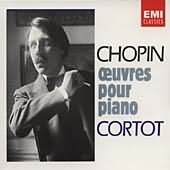Alfred Cortot’s Chopin abounds with ecstasy, risk, idiosyncratic rubato, soaring melodic projection, and boundless nuance. A brilliant but erratic technician, Cortot was infamous for wrong notes but less celebrated for how he always nailed the perfect tempo for a particular piece. Like most pianists of his generation, Cortot pulls inner voices out of the woodwork, adds bass octaves at will, and doesn’t always synchronize his hands, yet he employs these devices toward specific coloristic and expressive ends.
EMI’s newly re-released 1991 six-disc Cortot/Chopin anthology stands out for the inclusion of otherwise hard-to-find rarities, such as the pianist’s 1943 French HMV Etudes, Preludes, and Waltzes. Generally these sets are inferior to their better-known 1933/34 counterparts, notwithstanding individual flights of fancy not replicated elsewhere (the Op. 10 No. 2 Etude’s highlighted tenor voice, the Op. 18 Waltz’s dynamic surges).
Cortot’s 1933/34 Etudes are reproduced intact, yet only four selections represent the 1934 Waltzes, together with a handful of Preludes from Cortot’s 1926 cycle and a previously unissued 1928 take of the 12th Prelude. As for other cycles, those in charge rightly opted for Cortot’s 1933 Ballades, 1931 B minor sonata, 1933 B-flat minor sonata, and 1929 E-flat Nocturne Op. 9 No. 2 over other Cortot versions, plus the classic, impassioned 1933 recordings of the Tarantella, the Barcarolle, and the F minor Fantasy. But I don’t share annotator Guthrie Luke’s justifications for omitting the 1933 Fantasie-Impromptu. True, it’s not Cortot at his best, but it’s far from his worst.
The thrice-familiar A-flat Polonaise conveys sweeping élan, albeit without the poise and polish of other 78-era interpretations (Rubinstein, Lhevinne, and Horowitz, for example), but the F minor concerto’s classic stature needs no qualification. And Disc 1 offers a choice selection from Cortot’s acoustic and early electrical Chopin 78s.
Charles Levin’s transfers more than hold their own alongside competing restorations by Ward Marston and Seth Winner, although the 1949-51 Nocturnes, C-sharp minor Prelude Op. 45, and Nouvelles Etudes boast less surface noise and more mid-range emphasis via APR’s late Cortot reissue series. Thanks to Arkivmusic.com’s on-demand reprint program for making this fascinating collection available again.
































